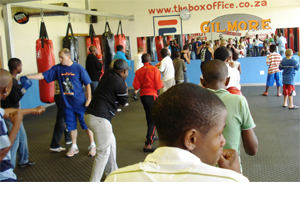Paper studies success of sport intervention in troubled youths
06 January 2014 | Story by Newsroom
It's an adage that sport is a powerful change agent, steering youth away from, and even out of, trouble.
But it's harder to 'keep score' of the effectiveness of formal sport interventions to show planners and funders that the projects they design and sponsor actually do work.
In a paper recently published in the Psychology of Sport and Exercise journal, Dr Catherine Draper of the UCT/MRC Research Unit for Exercise Science and Sports Medicine and her co-authors have sought to understand perceptions of, and factors influencing, effectiveness. It is hoped that this information can be used to guide the development or expansion of 'sport for good' programmes.
Draper and her co-authors '“ Sheri Errington, Shadea Omar and Stanley Makhita of the Teddy Bear Clinic for Abused Children in Johannesburg '“ conducted a scientific evaluation of Fight with Insight, a "diversionary" boxing programme for young sexual offenders aged between 11 and 19.
This rehabilitation programme is working to turn around the lives of a group of teens by changing their cognitive behaviour, ramping up their self-esteem, and aiming to keep them out of prison.
South Africa has one of the highest rates of sexual crime in the world. It's reported that almost half of all victims are children and that around 42% of sexual offences are committed by children.
They're not all from disadvantaged homes, says Draper. "It's a spectrum. And it's not only boys."
Research has shown that adult methods of treatment have not been shown to be as effective for youth. One of the dangers for young sexual offenders is recidivism, or repeat behaviour, among these teens.
"These [adult] programmes don't address the psychological needs of the youth. And interventions with the perpetrators are vital to breaking the cycle of abuse."
Offered by trained facilitators and boxing coaches, the 12-week Fight with Insight programme combines boxing with cognitive-behavioural therapy, the cornerstone of treatment for sexual offenders referred by the courts or schools.
Youths attend a boxing session and then go on to a cognitive-behavioural group therapy session where they're encouraged to understand the triggers of their dysfunction.
The boxing therapy doesn't encourage violent behaviour, but rather provides a controlled environment. There are also more explicit processes at play that develop participants, says Draper.
Boxing can be used as is a vehicle to address unmet emotional needs, she adds. It empowers and holistically develops participants and provides alternative means of expressing themselves. It also exposes them to positive role models in the boxing context.
When interviewed as part of the research, key informants (staff who work with the youth) said they felt that participants have the freedom to talk, feel and express themselves in a non-judgemental setting.
Draper says self-awareness is encouraged as participants share their feelings when they 'check in' and 'check out' at the start and end of every session.
The boxing coach teaches four principles: first impressions (creating the right impression that shows self-respect, and respect for others); compassion; consequences of action; and moving on from the result.
"There are metaphors that relate to life, such as the concept of authority figures in life (referees); understanding that there is a place and time for everything; and the importance of discipline."
Boxing is also seen as an excellent platform for the development of discipline, says Draper.
"As participants develop these skills they are able to experience a sense of achievement and mastery, feel physically stronger, and learn their capabilities and limits. All of which are empowering and can help to develop self-esteem and confidence."
They also learn empathy. In the boxing context this this involves learning to spar without hurting one other.
Draper and her co-authors looked specifically at the kind of research that could benefit the programme and have value academically.
"Our research shows how, and why, it's working. By isolating the key success ingredients, we could identify and use information to improve and replicate the programme. And now that the information is in the format of a research paper, it's better articulated," she said.
For the research sponsors, the Laureus Sport for Good Foundation, the evaluation demonstrates that the resources put into this programme are well spent.
"It's been great to be able to do something that can positively impact on how they run their programme," said Draper. "And it will help shape growth in this direction."
Story by Helen Swingler. Image supplied by Teddy Bear Clinic.
 This work is licensed under a Creative Commons Attribution-NoDerivatives 4.0 International License.
This work is licensed under a Creative Commons Attribution-NoDerivatives 4.0 International License.
Please view the republishing articles page for more information.
Related
Balancing the paddle and the law books
12 Feb 2026










